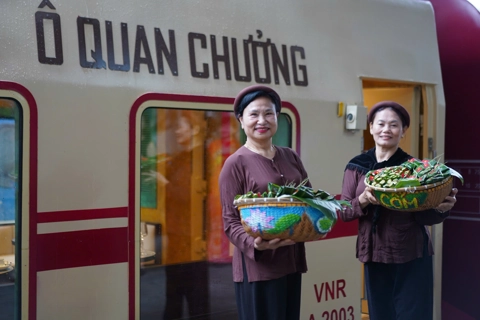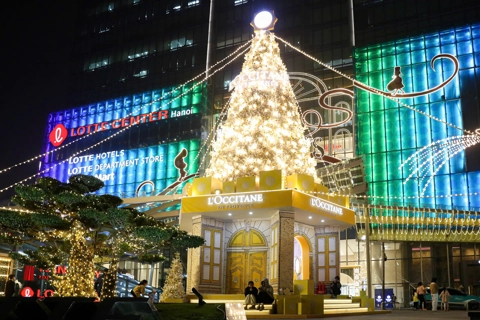Life
Vietnamese kindergarten’s design draws plaudits
May 26, 2016 / 03:40 PM
Farming Kindergarten, designed by Vo Trong Nghia Architecture Company, has been listed as one of the top 30 architectural designs in terms of aesthetics.
The building was nominated by the Royal Institute of British Architects (RIBA).
Located in Bien Hoa City in the southern province of Dong Nai, Farming Kindergarten educates 500 children of low-income factory workers employed at an adjacent shoe factory owned by the Pou Chen Corporation, which makes footwear for the likes of Nike, Adidas and Reebok.
The project was designed by architects Vo Trong Nghia, Tran Thi Hang, Kuniko Onishi, Takashi Niwa and Masaaki Iwamoto. The two-story building was built with a fixed budget of some 500 USD per sq.m., including all equipment and material, and is characterised by a triple-ring green roof that encloses three secure playgrounds.
The green roof serves as an additional playground and also as a vegetable garden for the kids to learn how to grow food. The building is passively-cooled and features a rainwater recycling and irrigation system.
“We studied the sustainable model of kindergartens in several tropical countries to design this one for Vietnamese children,” Nghia said.
“After just one year of operation, this building has saved 25 percent energy in comparison with other kindergartens with similar capacity.”
The kindergarten is the only facility built for children in the list. The others on the list include the Culture House Rozet in Netherlands, the European Hansemuseum in Germany, the Fine Arts Museum of Asturias in Spain, and the Public Library of Constitucion in Chile. More than 20 countries are represented on the list.
The selected architecture projects vary in size, cost, and style – each structure displays architectural innovation and excellence. The projects include a wide range - large urban infrastructure schemes, private residential projects, cultural destinations and civic spaces, as well as academic buildings and places of worship.
Entries were submitted from 50 countries, out of which six finalists will be visited. The winner of the first RIBA International Prize will be announced in December.
Setting a new global standard for architectural achievement, the prize will be judged by an expert panel led by world-renowned architect, Richard Rogers.
“The winning building will demonstrate visionary, innovative thinking and excellence of execution, whilst making a distinct contribution to its users and to its physical context. Unlike any previous RIBA award for architecture, the RIBA International Prize is open to any qualified architect in the world,” RIBA President Jane Duncan said.
Located in Bien Hoa City in the southern province of Dong Nai, Farming Kindergarten educates 500 children of low-income factory workers employed at an adjacent shoe factory owned by the Pou Chen Corporation, which makes footwear for the likes of Nike, Adidas and Reebok.
The project was designed by architects Vo Trong Nghia, Tran Thi Hang, Kuniko Onishi, Takashi Niwa and Masaaki Iwamoto. The two-story building was built with a fixed budget of some 500 USD per sq.m., including all equipment and material, and is characterised by a triple-ring green roof that encloses three secure playgrounds.
The green roof serves as an additional playground and also as a vegetable garden for the kids to learn how to grow food. The building is passively-cooled and features a rainwater recycling and irrigation system.

The green roof serves as an additional playground and also as a vegetable garden for the kids to learn how to grow food.
|
“After just one year of operation, this building has saved 25 percent energy in comparison with other kindergartens with similar capacity.”
The kindergarten is the only facility built for children in the list. The others on the list include the Culture House Rozet in Netherlands, the European Hansemuseum in Germany, the Fine Arts Museum of Asturias in Spain, and the Public Library of Constitucion in Chile. More than 20 countries are represented on the list.
The selected architecture projects vary in size, cost, and style – each structure displays architectural innovation and excellence. The projects include a wide range - large urban infrastructure schemes, private residential projects, cultural destinations and civic spaces, as well as academic buildings and places of worship.
Entries were submitted from 50 countries, out of which six finalists will be visited. The winner of the first RIBA International Prize will be announced in December.
Setting a new global standard for architectural achievement, the prize will be judged by an expert panel led by world-renowned architect, Richard Rogers.
“The winning building will demonstrate visionary, innovative thinking and excellence of execution, whilst making a distinct contribution to its users and to its physical context. Unlike any previous RIBA award for architecture, the RIBA International Prize is open to any qualified architect in the world,” RIBA President Jane Duncan said.








